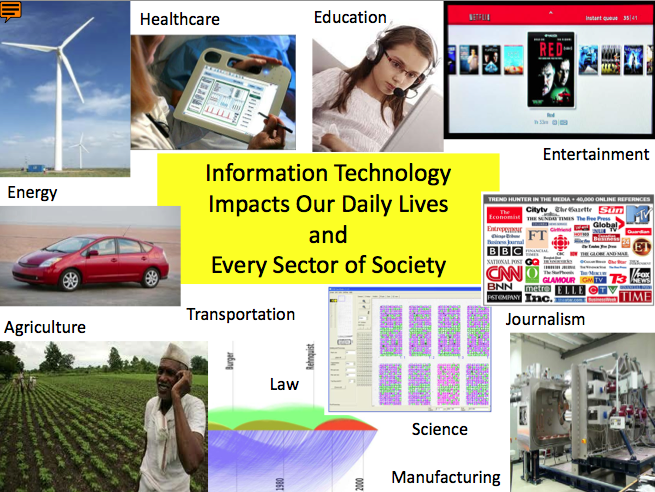February 16, 2012 - Washington, DC Overview and Agenda Photos
"A Day in the Life"
![]() Download Summary
Download Summary
![]() Download PDF Slides
Download PDF Slides
![]() Download Video
Download Video
Summary

Progress in information technology over the past 20 years has dramatically changed our lives – in our daily routines, at play, and at work. Today's homes are "smarter" and richer in day-to-day conveniences, largely as a result of significant advances in mobile devices, wireless networks, robots, sensors and actuators, software services, data analytics, optimization and approximation algorithms, and social networks and media. For example, to heat and cool our homes, we no longer adjust the thermostat every time we feel too cool or too warm; we use programmable thermostats that automatically sense and adapt, based on our needs and routines. To turn our lights on or off, we no longer use the switches that come with our lamps; we rely on motion sensor technology that can detect the presence (or absence) of an individual in a particular room and alter the state of the light accordingly. To clean our house, we no longer use the Dyson G-force cyclonic vacuum cleaner; we use a robot that can vacuum wood floors, carpeting, and even pet hairs.
Advances in information technology have changed the way we read books, listen to music, watch movies, go shopping, search for information, and communicate with friends and family. We have replaced shelves overflowing with books with e-readers and e-books. We have replaced towers of CDs with personal music devices that store thousands of songs that can be purchased and downloaded from the Internet individually. We can listen to music anywhere, anytime, and while doing anything. We have replaced videotapes and VCRs with streaming video and services for accessing thousands of movies without getting off the living room couch. We used to go to the mall; now we shop online. Children used to visit their grandparents only on special occasions and holidays; now they can "visit" them daily by using free Internet video chatting services from the comfort of the family room.
Advances in information technology also have had an impact on all business and professional sectors, from healthcare to energy, agriculture, transportation, education, law, engineering, science, and the humanities. New devices, wireless networks, data analytics, and social media are helping us realize a more efficient, cost-effective, and safer patient-centric healthcare system. Mobile phone technology enables farmers, even those in underdeveloped regions and countries, e.g., grape growers in India and cocoa farmers in Ghana, to determine market prices, crop volumes, transportation costs, and weather forecasts, thereby increasing their productivity and standard of living. Programmable engine control units, coupled with automatic braking, cruise control, advance collision warning, and parking systems make today's vehicles networks of computers. Wireless sensor networks monitor the health of the structures we build, such as airplanes, buildings, and bridges, thus preparing us better for prevention and detection of failures and recovery from disasters. The explosion of online learning systems means millions of people around the world have affordable access to instruction by the best in the field. Mathematicians use wikis and blogs for expeditious collaboration in proving theorems or disputing claims. Scientists apply data mining and machine learning on exabytes of data to find patterns and make new discoveries. Crowd-sourcing and gaming enable citizen science at Internet scale.
Information technology impacts our daily lives and every sector of society. If we continue to make the kind of progress in information technology as we have made for the past 20 years, imagine what life will be like in another 20 years!
Jeannette Wing
 Jeannette Wing is the President's Professor of Computer Science and head of the Computer Science Department at Carnegie Mellon University. She received her S.B., S.M., and Ph.D. degrees from the Massachusetts Institute of Technology. From 2007-2010 she was the assistant director of the Computer and Information Science and Engineering Directorate at the National Science Foundation. Dr. Wing's general research interests are in the areas of trustworthy computing, specification and verification, concurrent and distributed systems, programming languages, and software engineering. Her current interests are on the foundations of trustworthy computing, with a focus on the science of security and privacy. Dr. Wing was or is on the editorial board of twelve journals. She is a member of Computing Research Association Board and the Microsoft Trustworthy Computing Academic Advisory Board. She has been a member of many other advisory boards, including the Networking and Information Technology (NITRD) Technical Advisory Group to the President's Council of Advisors on Science and Technology (PCAST), the National Academies of Sciences' Computer Science and Telecommunications Board, ACM Council, the DARPA Information Science and Technology (ISAT) Board, NSF's CISE Advisory Committee,
the Intel Research Pittsburgh's Advisory Board, and the Sloan Research Fellowships Program Committee. She served as co-chair of NITRD from 2007-2010. She received the CRA Distinguished Service Award in 2011. She is a member of Sigma Xi, Phi Beta Kappa, Tau Beta Pi, and Eta Kappa Nu. She is a fellow of the American Academy of Arts and Sciences, American Association for the Advancement of Science, the Association for Computing Machinery (ACM), and the Institute of Electrical and Electronic Engineers (IEEE).
Jeannette Wing is the President's Professor of Computer Science and head of the Computer Science Department at Carnegie Mellon University. She received her S.B., S.M., and Ph.D. degrees from the Massachusetts Institute of Technology. From 2007-2010 she was the assistant director of the Computer and Information Science and Engineering Directorate at the National Science Foundation. Dr. Wing's general research interests are in the areas of trustworthy computing, specification and verification, concurrent and distributed systems, programming languages, and software engineering. Her current interests are on the foundations of trustworthy computing, with a focus on the science of security and privacy. Dr. Wing was or is on the editorial board of twelve journals. She is a member of Computing Research Association Board and the Microsoft Trustworthy Computing Academic Advisory Board. She has been a member of many other advisory boards, including the Networking and Information Technology (NITRD) Technical Advisory Group to the President's Council of Advisors on Science and Technology (PCAST), the National Academies of Sciences' Computer Science and Telecommunications Board, ACM Council, the DARPA Information Science and Technology (ISAT) Board, NSF's CISE Advisory Committee,
the Intel Research Pittsburgh's Advisory Board, and the Sloan Research Fellowships Program Committee. She served as co-chair of NITRD from 2007-2010. She received the CRA Distinguished Service Award in 2011. She is a member of Sigma Xi, Phi Beta Kappa, Tau Beta Pi, and Eta Kappa Nu. She is a fellow of the American Academy of Arts and Sciences, American Association for the Advancement of Science, the Association for Computing Machinery (ACM), and the Institute of Electrical and Electronic Engineers (IEEE).
The materials on this webpage, including speakers' slides and videos, are copyright the author(s).
Permission is granted for non-commercial use with credit to the author(s) and the Computing Community Consortium (CCC).


